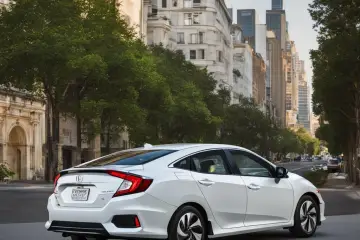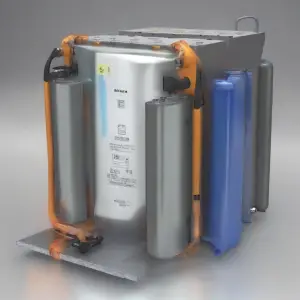EV Battery Life: What to Expect From Your Electric Vehicle

EV Battery

You’ve decided to go electric and buy anEV. Great choice—you’re helping the planet and embracing the future of driving. But now you’re probably wondering, how long will the battery actually last? Don’t worry, EV batteries are built to provide years of reliable service. Still, there are a few things you should know to get the most out of your EV battery and keep your new wheels running for the long haul.
How Do EV Batteries Work?
EV batteries are rechargeable lithium-ion batteries, similar to what powers your laptop or smartphone, just on a much larger scale. How Do They Work?
EV batteries contain cells with positive and negative electrodes called cathodes and anodes. When the battery is in use, lithium ions move from the anode to the cathode, creating an electric current to power the vehicle. Recharging the battery moves the ions back to the anode where they are stored until needed again.
The amount of energy a battery can store determines an EV’s range on a single charge. Currently, most affordable EVs have a range of 150 to 250 miles per charge while higher-end models can go 300 miles or more. Range is affected by factors like battery size, energy density, and driving conditions like speed, hills or use of accessories like AC or heat.
Battery life refers to how long it takes before a battery needs replacement. On average, EV batteries last 8-12 years before significant degradation, though some may last longer. Battery life depends on the number of charge cycles, charging and discharging rates, and temperature. Faster charging and extreme heat or cold can reduce life.
To maximize your EV’s battery life:
•Avoid draining or fully recharging the battery when possible. Keep charge levels between 20 to 80% for the best health.
•Use slower Level 2 charging at home instead of fast charging when you can. Fast charging should only be used occasionally for long trips.
•Park your EV in a garage if possible. Temperature extremes can be hard on the battery.
•Don’t leave your EV sitting for long periods without use. It’s best to drive at least once a week or so and recharge as needed to prevent battery drain.
By understanding how your EV’s battery works and following some best practices, you can ensure many years of reliable performance from your electric vehicle. The future of sustainable transportation depends on it!
Factors That Impact EV Battery Life
Several factors determine how long an EV battery will last. The good news is, if you take good care of your EV’s battery, it should provide many years of reliable service.
Charging Habits
How and when you charge your EV battery has a big impact on its longevity. For the best battery health, charge your EV to 80-90% at most, and avoid fully depleting or fully recharging the battery when possible. Also, avoid rapid or fast charging too often, which can cause the battery to heat up and degrade faster over time. Stick to standard overnight charging at home whenever you can.
Environmental Conditions
Extreme heat or cold can be hard on EV batteries. High temperatures increase the rate of battery degradation, while freezing temps reduce your range. Park your EV in a garage or sheltered area when possible, and avoid leaving it outside in very hot or cold weather for long periods. The ideal temperature range for most EV batteries is 65 to 72 F.
Usage
How much you use your EV also determines how long the battery will last. More frequent use and higher mileage means faster battery degradation over time. However, EV batteries lose capacity even when not in use, through a process called self-discharge. It’s best to drive your EV regularly to keep the battery active and in good working condition. For the most even battery aging, aim for at least 30-50 miles of driving per week.
By following good charging practices, sheltering your EV from environmental extremes, and maintaining regular usage, you can expect most EV batteries to retain 60-75% of their capacity after 8-12 years. With some basic TLC, your EV’s battery should provide many years of reliable zero-emission driving.
Average EV Battery Lifespan
The lithium-ion batteries in electric vehicles will gradually lose capacity over time and with use. However, EV batteries are designed to still have up to 70-80% of their capacity after 8-12 years of normal use. The average EV battery lifespan depends on several factors:
Battery chemistry
The type of cathode and anode materials used in the battery cells impacts longevity. Batteries with nickel-cobalt-aluminum or nickel-manganese-cobalt cathodes typically last 8-10 years. Batteries with lithium-iron-phosphate cathodes can last 10-15 years. Newer lithium-nickel-manganese-cobalt and lithium-nickel-cobalt-aluminum chemistries are improving lifespan to 12 years or more.
Climate and temperature
Batteries age faster in extreme heat or cold. Storing and charging EVs in a garage or sheltered area is best. Battery thermal management systems help regulate temperature for maximum lifespan.
Charging habits
Frequent fast charging, leaving the battery at a high or low state of charge for long periods, and frequent full discharges of the battery can reduce lifespan. Ideally, charge the battery to 80% of capacity for daily use and avoid draining it below 20% when possible. Only use fast charging when needed for long trips.
Battery size
Batteries with larger capacity, like 60 kWh or more, may have slightly shorter lifespans since they go through more charge cycles to power the vehicle over its lifetime. However, newer chemistries and improved thermal management help offset capacity impacts.
While EV batteries are consumable components, proper care and charging can help maximize their useful life to 8-15 years for most drivers. Battery technology and management continue to improve, so EV owners today can feel confident in getting many years of service from their vehicle’s battery pack. Regular battery health checks from your vehicle’s diagnostic system will alert you if the pack starts to significantly deteriorate before its time.
Tips to Maximize Your EV Battery Life
To get the most life out of your EV battery, here are some tips to keep in mind:
Limit Fast Charging When Possible
While fast charging is convenient, it can degrade your battery over time. If you can, charge at home overnight or at work during the day. Slow charging is gentler and better for long term battery health. Only use fast charging when necessary for longer trips.
Keep Your Battery Cool
High heat is the enemy of lithium-ion batteries like in EVs. Park in the shade when possible and avoid leaving your vehicle in extremely hot environments for long periods. The cooler the temperature, the slower the battery degradation. Using a thermal management system to actively cool the battery also helps.
Don’t Drain or Top Off the Battery Fully
For the best battery life, avoid draining it below 20% or charging it above 80% when possible. Fully depleting or topping off the battery puts extra stress on it during recharging. The closer you keep it to the 40-60% range, the less degradation over time.
Charge the Battery Regularly
Even if you don’t drive much, it’s best to charge your EV battery at least once a week to keep it at an optimal state of charge. Letting it sit for longer periods without charging can cause permanent damage. A little charge goes a long way.
Consider Battery Preconditioning
If available for your EV, use the battery preconditioning feature before fast charging or in very hot/cold weather. This helps bring the battery to an ideal temperature range which reduces stress and extends its useful life. Though it requires power to operate, the benefits to your battery health can be well worth it.
Following these best practices for charging and caring for your EV battery will help ensure you get the maximum mileage and performance from your vehicle over its lifetime. While some capacity loss is inevitable, you can do your part to minimize unnecessary battery degradation with a little TLC.
Options When Your EV Battery Needs Replacing
When your EV’s battery starts to lose capacity, you have a few options to consider for replacement.
Replace the entire battery pack
The most comprehensive option is to replace the entire battery pack. Battery packs are made up of individual battery cells, and over time they start to degrade at different rates, reducing the overall capacity and performance. Replacing the whole pack will give you a fresh set of properly matched battery cells, restoring your EV to like-new range and performance. However, battery packs are expensive, often $10,000-$15,000 or more for a full replacement.
Replace only degraded cells
Some EV batteries allow for replacement of individual battery cells or modules. Technicians can test your battery to determine which specific cells have degraded, and only replace those. This is more affordable than a full pack replacement, but may not restore quite as much range and performance as a new pack would. Cell replacement is really only effective if a minority of cells in the overall pack are degraded. If most cells need replacement, you’re better off with a full new battery pack.
Reuse or refurbish the existing battery
Some companies specialize in reusing or refurbishing existing EV batteries. They can test and evaluate your used battery pack, replace any degraded cells, and rebalance the pack to restore performance and range. The refurbished pack can then be reinstalled in your vehicle at a lower cost than a brand new replacement pack. However, refurbished packs may have a shorter lifespan than a new battery and typically come with a shorter warranty.
Sell or trade-in the vehicle
If your EV’s battery life has seriously degraded and the replacement options seem too expensive, you can consider selling or trading in the vehicle. Many buyers are interested in used EVs even with some battery degradation, as long as the range and performance loss is disclosed upfront and factored into the price. You can then use the proceeds from the sale to help purchase another used or new EV with a fresh, warrantied battery pack.
In the end, you have to weigh the costs and benefits of each option based on your needs, budget, and how long you plan to keep the vehicle. With some proactive planning, you can make the best choice for maximizing your EV’s battery life.
EV Battery Recycling and Disposal
EV batteries are a key component of electric vehicles, but they don’t last forever. After several years of use, EV batteries start to lose capacity and range. Once an EV battery reaches the end of its useful life, it needs to be properly recycled or disposed of.
Battery Life Expectancy
The typical EV battery will last 8-12 years before needing replacement, depending on factors like battery chemistry, weather conditions, and how often fast charging is used. As the battery ages, you can expect to lose around 10% of its range and capacity per year. EV makers like Tesla and Nissan offer battery replacement programs to restore lost range and power once the original battery starts to significantly degrade.
Battery Recycling
Rather than sending old EV batteries to landfills, the best option is to recycle them. EV makers and third-party companies offer battery recycling programs to properly dispose of and repurpose EV batteries. The batteries are broken down into their core components like lithium, nickel, and cobalt, which are reused to make new batteries and other products.
Recycling EV batteries helps minimize waste and environmental impact. It also reduces the need for mining rare earth metals required to manufacture new batteries. Many areas offer financial incentives for EV owners to recycle their old batteries rather than throwing them out.
Proper Disposal
If recycling your EV battery isn’t possible, the next best step is to properly dispose of it according to local regulations. EV batteries contain hazardous chemicals and should never be thrown in the trash, dumped illegally, or burnt. Many auto parts stores, repair shops, and waste management facilities offer battery disposal services for a fee. They will handle the battery in an environmentally responsible way.
Your EV battery is an important and valuable resource. Making sure it’s properly handled at the end of its life is an important step towards sustainable electric vehicle ownership and a greener planet for future generations. Following recommended guidelines for maximizing its lifespan, recycling when possible, and properly disposing of it if needed is the responsible thing to do.
EV Battery Warranties and Replacement Costs
EV battery warranties typically last 8-10 years or 100,000 miles, whichever comes first. The warranty covers any defects in the battery that prevent it from holding a charge properly. However, the warranty does not cover normal degradation of the battery over time.
Battery Life Expectancy
Most EV batteries will retain 60-75% of their capacity after 8-10 years. The rate of degradation depends on factors like:
- Climate and temperature – Extreme heat or cold can accelerate battery degradation. Storing your EV in a garage and limiting use of fast charging in very hot or cold weather can help maximize battery life.
- Charging habits – Frequent fast charging, especially charging to 100% capacity, can degrade the battery faster over time. It’s best to charge to around 80% for daily use when possible.
- Vehicle usage – High mileage, frequent acceleration and braking, towing heavy loads, and driving at high speeds for long periods will degrade the battery more quickly. Moderate driving habits can extend range over the lifetime of the battery.
- Battery chemistry – Some lithium-ion battery types, like lithium nickel manganese cobalt oxide (NMC), may degrade slightly faster than others. But technology is rapidly improving battery chemistry for longer lifespans.
Replacement Costs
Once an EV battery degrades to 60-75% of its original capacity, you’ll notice a significant drop in range. Replacement batteries typically cost between $5,000 to $15,000 or more, depending on the vehicle and battery specs. Battery technology is evolving quickly, so replacement costs are likely to decrease over time.
Some automakers like Tesla and Nissan already offer battery replacement and refurbishment programs to give EV batteries a “second life” for energy storage or reuse in vehicles. As EVs become more mainstream, battery recycling and remanufacturing will help make replacement batteries more affordable and sustainable.
Overall, most EV owners can expect a battery to last 8-12 years before needing replacement. With moderate use and proper care, some batteries may last up to 15 years. But as technology improves, future EV batteries will likely have even longer lifespans and lower replacement costs.
Future EV Battery Technologies
Future battery technologies are on the horizon that could dramatically improve the range and longevity of EVs. Several promising options are currently in development and testing phases.
Solid-state batteries
Solid-state batteries replace the liquid or gel electrolyte found in current lithium-ion batteries with a solid, ceramic material. These have the potential to hold more energy in a smaller space, charge faster, and reduce the risk of overheating. Several major automakers and tech companies are investing heavily in solid-state battery research. Although still a few years away, solid-state batteries could eventually double the range of today’s EVs.
Lithium-sulfur batteries
Lithium-sulfur batteries utilize sulfur as the cathode material instead of the cobalt and nickel found in lithium-ion batteries. Sulfur is cheaper and more abundant, and lithium-sulfur batteries can store up to five times more energy for the same weight. However, they tend to degrade faster and have a shorter lifespan. Further improvements in stability and cycle life are needed before lithium-sulfur batteries are ready for mass-market EVs.
Other possibilities
Additional battery types worth watching include lithium-air, aluminum-air, sodium-ion, and redox flow batteries. Each has its pros and cons, but all aim to achieve higher energy density, faster charging, longer cycle life, and lower cost compared to today’s lithium-ion batteries.
While current EV batteries continue to improve incrementally, new battery technologies could be a game changer, allowing for significantly longer ranges, faster charging and lower costs. Whichever chemistries prove most promising, future EV owners will benefit from batteries that are more energy dense, affordable, durable and better for the environment. The road ahead looks bright for the future of EV batteries and sustainable transportation.
EV Battery FAQs: Your Top Questions Answered
EV batteries are designed to last, but many new owners still have questions about what to expect. Here are the answers to some of the most frequently asked questions about EV battery life.
How long will an EV battery last?
The average EV battery should last at least 10-15 years before needing replacement. The total range may decrease over time, but the battery should still work for many years. Some factors that affect battery life include:
- Number of charge cycles. Each full charge cycle (from 0% to 100%) puts a little wear on the battery. More frequent charging and discharging will reduce lifetime.
- Extreme heat or cold. Extreme temperatures can degrade the battery faster. Parking in a garage and limiting time in very hot/cold weather when possible helps.
- Fast charging. While convenient, fast charging an EV battery more often can reduce its lifespan slightly compared to standard charging. Limit fast charging when you can.
- Battery size. Larger batteries tend to last a bit longer. They don’t have to work as hard to provide the same range.
Do I need to replace an EV battery?
Replacing an EV battery is expensive, so most owners will not need a full replacement during the vehicle’s lifetime. However, some level of capacity loss is normal over time. If range decreases significantly, you have a few options:
- Limit use. For some owners, a 20-30% loss of max range may still suit their needs. You can simply continue driving the vehicle as-is.
- Battery refresh. Some automakers offer battery “refreshing” services to restore around 10% of lost capacity. This procedure cycles the battery to rebalance the cells.
- Partial replacement. If a portion of the battery has degraded, just the affected modules can be replaced. This is more affordable than a full battery swap.
- Full replacement. As a last resort, you can replace the entire battery. Costs currently range from $5,000 to $30,000 or more for a new EV battery, depending on the vehicle and battery size.
By following best practices for charging and care, most EV owners can expect strong battery life for many years before any major capacity loss or replacement needs. But it’s good to understand your options in case you do start to notice a drop in range over time.
Conclusion
So now you know how long you can expect your EV battery to last and what factors affect its lifespan. While range anxiety used to be a major concern for potential EV owners, advancements in battery technology have come a long way in alleviating those fears. Most EV batteries today will provide many years of reliable service before needing replacement. And when that time comes, the cost to replace EV batteries has also declined substantially.
The bottom line is this: if you’ve been curious about making the switch to an electric vehicle but worried about battery life, you can rest assured that modern EV batteries are built to handle the demands of daily driving. So go take a spin in an EV, experience the instant torque and quiet ride for yourself. You might just find yourself becoming an EV enthusiast and join the growing number of people who swear they’ll never go back to gas-powered cars again! The future is electric, and EV battery life is no longer a roadblock to getting there.















No Comment